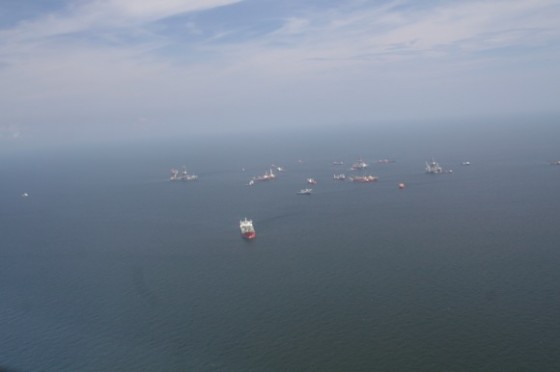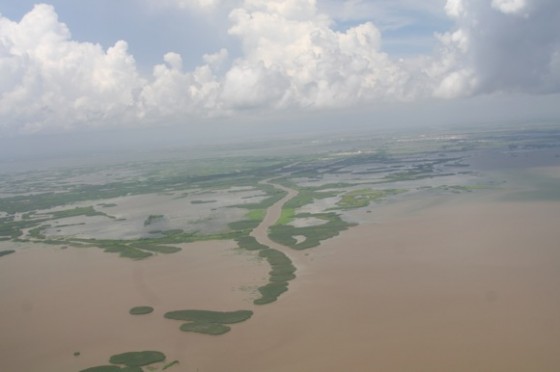Can We Expect Real accountability and Real Change?
In August two members of the PDX 2 Gulf Coast team flew over the Deepwater Horizon spill site. Three months ago, Bob Sallinger’s words still carry heavy meaning. We’re featuring his post as a reminder that none of this is over, and the fight continues.
I’m a vampire, babe,
suckin’ blood
from the earth
I’m a vampire, baby,
suckin’ blood
from the earth.
Well, I’m a vampire, babe,
sell you
twenty barrels worth.
Vampire Blues
Neil Young
The Deepwater Horizon now lies 5,000 feet below the surface of the ocean. Eleven men and more than a half a billion dollars worth of equipment have gone to a black watery grave–because British Petroleum chose to cut corners and our government stood idly by and allowed them to do it.
For nearly three months the earth vomited oil from this site, filling our ocean with 200 million gallons of poison, killing our wildlife and contaminating more than 600 miles of coastal marsh. It crippled the traditional fishing economy of the Gulf Coast and replaced it with a parasitic oil spill economy–a buzzing vortex of “oil spill responders” making a temporary living off of the very thing that is killing their jobs and their way of life.
After nearly 30 minutes of flying across the open ocean, there is little warning that you are approaching the Deepwater Horizon gravesite. The BP and Federal officials onboard this official press tour offer little in the way of information unless explicitly asked… and asking is not easy. We have been instructed to stay seated and wear ear plugs. I am mostly alone with my thoughts watching billowing clouds drifting above placid black water and listening to the rhythmic pounding of the chopper blades overhead as we make our way across nearly 50 miles of ocean.
I scan for oil on the water–the fishermen tell us that it is still out there, both on the surface and in giant subsurface plumes, while the government and BP assure us that it is mostly gone. Earlier in the trip we passed by several coastal islands with a clear ring of oil blackening their edges and miles of yellow and orange oil boom drifting in the surf. However, now that we are out over the open ocean, there is no oil to be seen.
I think about the marshlands we passed over at the start of the trip. The Mississippi Delta marshlands are the most extensive marshlands in North America providing critical habitat for over 100 million birds, a nursery for sea life, and a buffer for coastal communities against increasingly fierce hurricanes… and they are slowly sinking into the ocean before our eyes. Levees and water diversion structures on the Mississippi River have destroyed the river’s natural hydrology and prevent the flow of nutrient-rich sediment into the delta. Countless miles of canals dredged through the marshes for navigation and oil and gas extraction have allowed saltwater to flow into the marshlands killing vegetation. The combination has allowed the ocean to gradually inundate the marshes turning a vast sea of grass into open water. More than 2,300 square miles of marshland have been lost since 1930… an area the size of a football field is lost ever 38 minutes. From the air, the loss is apparent–inky black water coils around increasingly isolated patches of green. As devastating as the oil spill has been, it is really just one more insult on top of the astounding devastation we have already wreaked on this landscape. The impacts of the oil spill will eventually fade–the bigger challenge is going to be to use this event to catalyze restoration of this landscape before it disappears altogether.
The flat ocean and my thoughts are suddenly disrupted by a flotilla of vessels rising out of the hazy grayness: Large tankers, ships with cranes and landing pads, support and supply vessels, research vessels, and two new oil drilling rigs–the ones which eventually stopped the hemorrhaging. By my count there were at least 29 ships scattered about the isolated seascape. It is expected but somehow shocking none the less.
This is a place of death, a gravesite for the lost oil rig workers, a gaping wound in the earth spewing forth poison, even the response ships are ghostly in the grey hazy afternoon and the pilot keeps us far enough back that we can see no signs of life or activity on board–a ghost fleet above a deep-sea graveyard.
The media on the far side of the helicopter released themselves from their seats and we crowd around the tiny windows on the port side of the chopper with cameras clicking as the helicopter slowly circles the site three times. We came here to bear witness and to bring back lessons, but it feels also like we have become part of a ghoulish side-show–extras in the carefully scripted BP/ US Gov’t Response Circus. we burned more than 400 gallons of oil to fly here this morning and our federal and BP hosts can’t even tell us what the various ships and rigs are there to do. It is spectacle masquerading as transparency.
Someday soon all these ships will be gone. I wonder how we will memorialize the deaths, human and non-human, associated with the Deepwater Horizon. Will it be through real accountability and real change? Are we ready yet to sit somebody’s sorry ass in a jail cell? To pass and enforce real regulations to prevent these types of events from occurring again? To break-up the unholy strategic command structure that allows a company that killed its employees and poisoned our planet to help oversee the response? To begin the daunting work of restoring the Gulf Coast? Of weaning ourselves from fossil fuels? Or will we simply continue the charade of insipid political posturing, paying hollow homage in 400 gallon helicopter tourist over flights.
Two days after our visit to the Deepwater Horizon, the Obama administration announced that it was considering lifting the moratorium on deepwater drilling in the Gulf. We have been here before. Will we be here again?
By Bob Sallinger, Conservation Director, Audubon Society of Portland

























NO COMMENT
Leave a comment